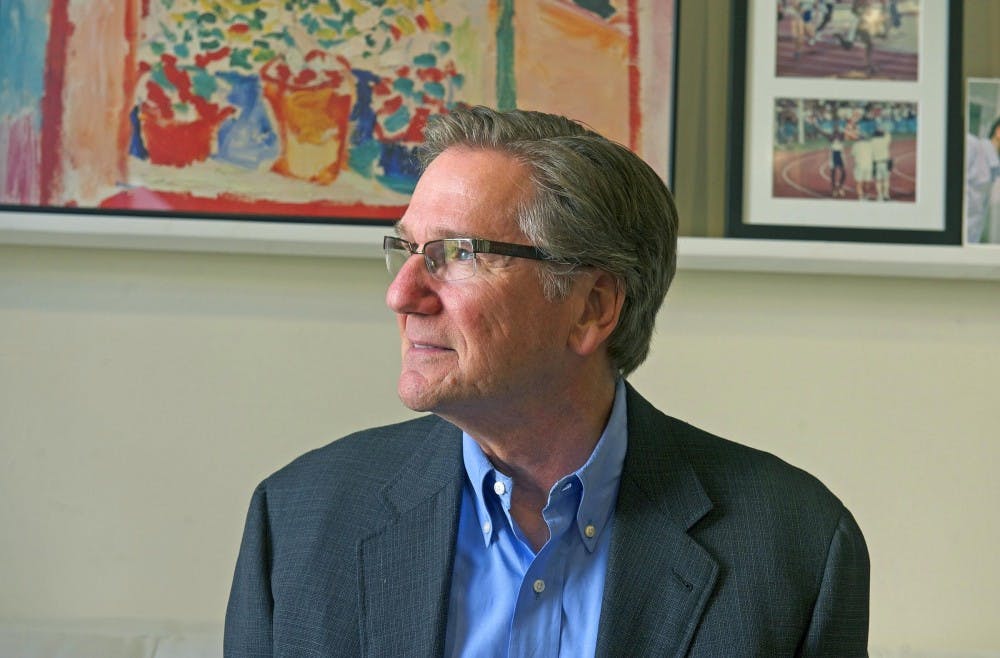John Adams, a marketing guru and CEO of the Martin Agency for 23 years, said he has found great joy in serving as one of the five Executives in Residence at the University of Richmond. Adams serves as a mentor and professor for students and would like to stay for as long as the school will let him, he said.
The Executives in Residence (EIR) program, which is sponsored by the Robins School of Business, allows students to speak with highly accomplished C-suite-level professionals and receive one-on-one guidance.
The program, pioneered by Nancy Bagranoff, dean of the Robins School of Business, came to fruition in the fall of 2011.
Although the program is primarily for Robins School of Business students, it is open to students of all majors, Dean Bagranoff said.
“These people have had really high-level careers and they know their industries well, so for students who don’t really understand the advertising or marketing world, and/or the world of corporate finance, these individuals can help with that,” she said.
In addition to discussing their industries, EIRs can help students prepare for interviews and develop their network, Shelley Burns, director of career programs in business, said.
“Their connections are much broader than what we provide, so it’s an additional, wonderful resource for helping students understand the power of networking and how to do it,” she said.
EIRs are expected to work about one day per week during the semester, but there is a lot of flexibility around that day, Bagranoff said.
Depending on what appeals to them, EIRs might also teach a class, work with student clubs and organizations, or attend career services liaison meetings, Bagranoff said.
Burns said the job is mostly a volunteer position, but the EIRs do get a small stipend for their time.
Bagranoff, who is in charge of recruiting the Executives in Residence, said she looks for people who are seeking purpose.
Enjoy what you're reading?
Signup for our newsletter
Bagranoff cites John Adams as a prime example of a "fabulous" EIR.
Adams grew up in Charleston, West Virginia, with his parents and two sisters. He was very shy growing up, so he played the piano and enjoyed playing in his sandbox, he said.
Adams double majored in English and history at Hampden-Sydney College, and then went on to work for a small newspaper in Chesterfield County, Virginia. He then worked for a telephone company as a speechwriter, and eventually started working at the Martin Agency in its public relations division.
Adams worked at the Martin Agency for 43 years, serving as CEO for his last 23 years.
“Going into business with a background that isn’t a business background, but in fact is an expressive background, like writing, is a marvelous opportunity to finally have somebody in a business environment that communicates as a human being,” Adams said.
Adams decided to become an EIR and an advertising professor at the University of Richmond three years ago after he retired from the Martin Agency.
“I retired from the Martin Agency not because I was tired of doing that, but because there were other things I wanted to do, and it seemed like a good time to do those, and this was one of them,” he said.
Adams said being an EIR has made him a better thinker.
“When you speak to a student about your convictions, about marketing, about advertising, when you have to say it out loud, you have to say it more precisely," he said. "So, I have refined my thinking."
Despite being unsure about teaching at first, Adams thoroughly enjoys it.
“I guess what I love is watching the process of learning and mastery take place," he said. "It is just a wonderful thing to watch."
Moving forward, Adams hopes to see changes in how the Robins School of Business deals with creative thinking.
“We all talk about the need for innovation, we all celebrate our entrepreneurs, we set up the iLab, but we don’t teach people how to access their creativity," he said. "We don’t really teach them tools to transform the way they think."
He thinks it is important for students to realize that creativity is the ability to create new ideas or new ways looking at the world, and does not require one to have a particular expressive skill, such as drawing.
“Most of the art directors at the Martin Agency can’t draw,” he said. “When they show an idea, in concept form, they’ve got these rough little, almost stick figures, and that is the way they convey their ideas. Because the creativity is the idea.”
Contact features writer Anna Ricci at anna.ricci@richmond.edu.
Support independent student media
You can make a tax-deductible donation by clicking the button below, which takes you to our secure PayPal account. The page is set up to receive contributions in whatever amount you designate. We look forward to using the money we raise to further our mission of providing honest and accurate information to students, faculty, staff, alumni and others in the general public.
Donate Now



